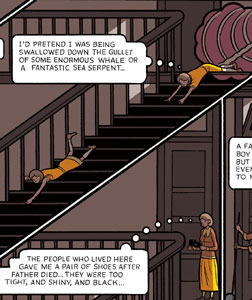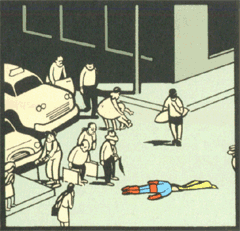clap clap blog: we have moved |
HOME |
ARCHIVES |
E-mail Me: TSC | MP3
THE DAILY ROUTINE: Flux | Hillary | Zoilus | Jesse | Sasha F/J | PopText | Tom B. | Popjustice | Bryan | Anthony Recidivism | Boing | Stereo | Chris | Tiny | Todd | DYFLY? | Brooks | Banana | Le Fou PUBLICATIONS I LIKE: Salon | PF | Stylus | OHINY | Gawker | Wonkette | Defame MP3BLOGS: Robots | Grammophone | Tofu | Bubblegum | Ticket | Catch | Douglas | Daughters | TTIKTDA | Byron | IHOP I SHOULD CHECK MORE OFTEN: Nate | be.jazz | Rambler | Some | Cyn | Simon | jaymc | Matos | Casper Gardner | Keith | Marshall | No Fun | Diva | Waking | Marcello | Jakarta | A. Ross | Whatevs | Gutter RIP: NYLPM | Vadimus | Flyboy | TMFTML | Harm | Black Table | Nick |
HOME - ARCHIVES
3/30/03 - 4/6/03 4/6/03 - 4/13/03 4/13/03 - 4/20/03 4/20/03 - 4/27/03 4/27/03 - 5/4/03 5/4/03 - 5/11/03 5/11/03 - 5/18/03 5/18/03 - 5/25/03 5/25/03 - 6/1/03 6/1/03 - 6/8/03 6/8/03 - 6/15/03 6/15/03 - 6/22/03 6/22/03 - 6/29/03 6/29/03 - 7/6/03 7/6/03 - 7/13/03 7/13/03 - 7/20/03 7/20/03 - 7/27/03 7/27/03 - 8/3/03 8/3/03 - 8/10/03 8/10/03 - 8/17/03 8/17/03 - 8/24/03 8/24/03 - 8/31/03 8/31/03 - 9/7/03 9/7/03 - 9/14/03 9/14/03 - 9/21/03 9/21/03 - 9/28/03 9/28/03 - 10/5/03 10/5/03 - 10/12/03 10/12/03 - 10/19/03 10/19/03 - 10/26/03 10/26/03 - 11/2/03 11/2/03 - 11/9/03 11/9/03 - 11/16/03 11/16/03 - 11/23/03 11/23/03 - 11/30/03 11/30/03 - 12/7/03 12/7/03 - 12/14/03 12/14/03 - 12/21/03 12/21/03 - 12/28/03 12/28/03 - 1/4/04 1/4/04 - 1/11/04 1/11/04 - 1/18/04 1/18/04 - 1/25/04 1/25/04 - 2/1/04 2/1/04 - 2/8/04 2/8/04 - 2/15/04 2/15/04 - 2/22/04 2/22/04 - 2/29/04 2/29/04 - 3/7/04 3/7/04 - 3/14/04 3/14/04 - 3/21/04 3/21/04 - 3/28/04 3/28/04 - 4/4/04 4/4/04 - 4/11/04 4/11/04 - 4/18/04 4/18/04 - 4/25/04 4/25/04 - 5/2/04 5/2/04 - 5/9/04 5/9/04 - 5/16/04 5/16/04 - 5/23/04 5/23/04 - 5/30/04 5/30/04 - 6/6/04 6/6/04 - 6/13/04 6/13/04 - 6/20/04 6/20/04 - 6/27/04 6/27/04 - 7/4/04 7/4/04 - 7/11/04 7/11/04 - 7/18/04 7/18/04 - 7/25/04 7/25/04 - 8/1/04 8/1/04 - 8/8/04 8/15/04 - 8/22/04 8/29/04 - 9/5/04 9/5/04 - 9/12/04 9/12/04 - 9/19/04 9/19/04 - 9/26/04 9/26/04 - 10/3/04 10/3/04 - 10/10/04 10/10/04 - 10/17/04 10/17/04 - 10/24/04 10/24/04 - 10/31/04 10/31/04 - 11/7/04 11/7/04 - 11/14/04 11/14/04 - 11/21/04 11/21/04 - 11/28/04 11/28/04 - 12/5/04 12/5/04 - 12/12/04 12/12/04 - 12/19/04 12/19/04 - 12/26/04 12/26/04 - 1/2/05 1/2/05 - 1/9/05 1/9/05 - 1/16/05 1/16/05 - 1/23/05 1/23/05 - 1/30/05 1/30/05 - 2/6/05 2/6/05 - 2/13/05 2/13/05 - 2/20/05 2/20/05 - 2/27/05 2/27/05 - 3/6/05 3/6/05 - 3/13/05 3/13/05 - 3/20/05 3/20/05 - 3/27/05 3/27/05 - 4/3/05 4/3/05 - 4/10/05 4/10/05 - 4/17/05 4/17/05 - 4/24/05 4/24/05 - 5/1/05 5/1/05 - 5/8/05 5/8/05 - 5/15/05 5/15/05 - 5/22/05 5/22/05 - 5/29/05 5/29/05 - 6/5/05 6/5/05 - 6/12/05 6/12/05 - 6/19/05 6/19/05 - 6/26/05 6/26/05 - 7/3/05 7/10/05 - 7/17/05 7/17/05 - 7/24/05 7/24/05 - 7/31/05 7/31/05 - 8/7/05 8/7/05 - 8/14/05 8/14/05 - 8/21/05 8/21/05 - 8/28/05 8/28/05 - 9/4/05 9/11/05 - 9/18/05 9/18/05 - 9/25/05 9/25/05 - 10/2/05 10/2/05 - 10/9/05 10/9/05 - 10/16/05 10/16/05 - 10/23/05 10/23/05 - 10/30/05 10/30/05 - 11/6/05 11/6/05 - 11/13/05 11/13/05 - 11/20/05 11/20/05 - 11/27/05 11/27/05 - 12/4/05 12/4/05 - 12/11/05 12/11/05 - 12/18/05 12/25/05 - 1/1/06 1/1/06 - 1/8/06 1/8/06 - 1/15/06 1/15/06 - 1/22/06 1/22/06 - 1/29/06 2/5/06 - 2/12/06 2/12/06 - 2/19/06 2/19/06 - 2/26/06 2/26/06 - 3/5/06 3/5/06 - 3/12/06 3/19/06 - 3/26/06 3/26/06 - 4/2/06 4/2/06 - 4/9/06 4/9/06 - 4/16/06 4/23/06 - 4/30/06 4/30/06 - 5/7/06 5/7/06 - 5/14/06 5/14/06 - 5/21/06 5/21/06 - 5/28/06 5/28/06 - 6/4/06 6/11/06 - 6/18/06 6/18/06 - 6/25/06 7/23/06 - 7/30/06 7/30/06 - 8/6/06 8/6/06 - 8/13/06 8/13/06 - 8/20/06 8/20/06 - 8/27/06 9/3/06 - 9/10/06 11/5/06 - 11/12/06 11/12/06 - 11/19/06 11/26/06 - 12/3/06 12/31/06 - 1/7/07 1/7/07 - 1/14/07 1/28/07 - 2/4/07
3/30/03 - 4/6/03 4/6/03 - 4/13/03 4/13/03 - 4/20/03 4/20/03 - 4/27/03 4/27/03 - 5/4/03 5/4/03 - 5/11/03 5/11/03 - 5/18/03 5/18/03 - 5/25/03 5/25/03 - 6/1/03 6/1/03 - 6/8/03 6/8/03 - 6/15/03 6/15/03 - 6/22/03 6/22/03 - 6/29/03 6/29/03 - 7/6/03 7/6/03 - 7/13/03 7/13/03 - 7/20/03 7/20/03 - 7/27/03 7/27/03 - 8/3/03 8/3/03 - 8/10/03 8/10/03 - 8/17/03 8/17/03 - 8/24/03 8/24/03 - 8/31/03 8/31/03 - 9/7/03 9/7/03 - 9/14/03 9/14/03 - 9/21/03 9/21/03 - 9/28/03 9/28/03 - 10/5/03 10/5/03 - 10/12/03 10/12/03 - 10/19/03 10/19/03 - 10/26/03 10/26/03 - 11/2/03 11/2/03 - 11/9/03 11/9/03 - 11/16/03 11/16/03 - 11/23/03 11/23/03 - 11/30/03 11/30/03 - 12/7/03 12/7/03 - 12/14/03 12/14/03 - 12/21/03 12/21/03 - 12/28/03 12/28/03 - 1/4/04 1/4/04 - 1/11/04 1/11/04 - 1/18/04 1/18/04 - 1/25/04 1/25/04 - 2/1/04 2/1/04 - 2/8/04 2/8/04 - 2/15/04 2/15/04 - 2/22/04 2/22/04 - 2/29/04 2/29/04 - 3/7/04 3/7/04 - 3/14/04 3/14/04 - 3/21/04 3/21/04 - 3/28/04 3/28/04 - 4/4/04 4/4/04 - 4/11/04 4/11/04 - 4/18/04 4/18/04 - 4/25/04 4/25/04 - 5/2/04 5/2/04 - 5/9/04 5/9/04 - 5/16/04 5/16/04 - 5/23/04 5/23/04 - 5/30/04 5/30/04 - 6/6/04 6/6/04 - 6/13/04 6/13/04 - 6/20/04 6/20/04 - 6/27/04 6/27/04 - 7/4/04 7/4/04 - 7/11/04 7/11/04 - 7/18/04 7/18/04 - 7/25/04 7/25/04 - 8/1/04 8/1/04 - 8/8/04 8/15/04 - 8/22/04 8/29/04 - 9/5/04 9/5/04 - 9/12/04 9/12/04 - 9/19/04 9/19/04 - 9/26/04 9/26/04 - 10/3/04 10/3/04 - 10/10/04 10/10/04 - 10/17/04 10/17/04 - 10/24/04 10/24/04 - 10/31/04 10/31/04 - 11/7/04 11/7/04 - 11/14/04 11/14/04 - 11/21/04 11/21/04 - 11/28/04 11/28/04 - 12/5/04 12/5/04 - 12/12/04 12/12/04 - 12/19/04 12/19/04 - 12/26/04 12/26/04 - 1/2/05 1/2/05 - 1/9/05 1/9/05 - 1/16/05 1/16/05 - 1/23/05 1/23/05 - 1/30/05 1/30/05 - 2/6/05 2/6/05 - 2/13/05 2/13/05 - 2/20/05 2/20/05 - 2/27/05 2/27/05 - 3/6/05 3/6/05 - 3/13/05 3/13/05 - 3/20/05 3/20/05 - 3/27/05 3/27/05 - 4/3/05 4/3/05 - 4/10/05 4/10/05 - 4/17/05 4/17/05 - 4/24/05 4/24/05 - 5/1/05 5/1/05 - 5/8/05 5/8/05 - 5/15/05 5/15/05 - 5/22/05 5/22/05 - 5/29/05 5/29/05 - 6/5/05 6/5/05 - 6/12/05 6/12/05 - 6/19/05 6/19/05 - 6/26/05 6/26/05 - 7/3/05 7/10/05 - 7/17/05 7/17/05 - 7/24/05 7/24/05 - 7/31/05 7/31/05 - 8/7/05 8/7/05 - 8/14/05 8/14/05 - 8/21/05 8/21/05 - 8/28/05 8/28/05 - 9/4/05 9/11/05 - 9/18/05 9/18/05 - 9/25/05 9/25/05 - 10/2/05 10/2/05 - 10/9/05 10/9/05 - 10/16/05 10/16/05 - 10/23/05 10/23/05 - 10/30/05 10/30/05 - 11/6/05 11/6/05 - 11/13/05 11/13/05 - 11/20/05 11/20/05 - 11/27/05 11/27/05 - 12/4/05 12/4/05 - 12/11/05 12/11/05 - 12/18/05 12/25/05 - 1/1/06 1/1/06 - 1/8/06 1/8/06 - 1/15/06 1/15/06 - 1/22/06 1/22/06 - 1/29/06 2/5/06 - 2/12/06 2/12/06 - 2/19/06 2/19/06 - 2/26/06 2/26/06 - 3/5/06 3/5/06 - 3/12/06 3/19/06 - 3/26/06 3/26/06 - 4/2/06 4/2/06 - 4/9/06 4/9/06 - 4/16/06 4/23/06 - 4/30/06 4/30/06 - 5/7/06 5/7/06 - 5/14/06 5/14/06 - 5/21/06 5/21/06 - 5/28/06 5/28/06 - 6/4/06 6/11/06 - 6/18/06 6/18/06 - 6/25/06 7/23/06 - 7/30/06 7/30/06 - 8/6/06 8/6/06 - 8/13/06 8/13/06 - 8/20/06 8/20/06 - 8/27/06 9/3/06 - 9/10/06 11/5/06 - 11/12/06 11/12/06 - 11/19/06 11/26/06 - 12/3/06 12/31/06 - 1/7/07 1/7/07 - 1/14/07 1/28/07 - 2/4/07


